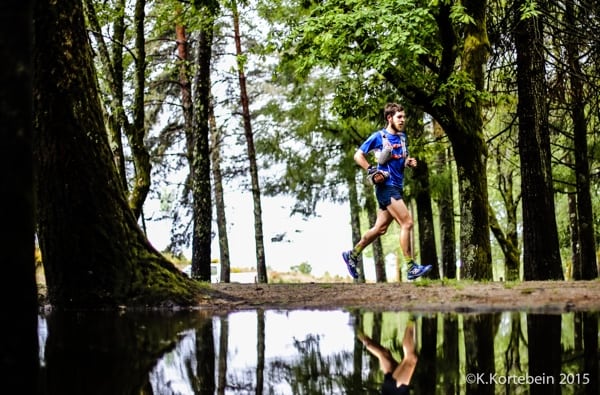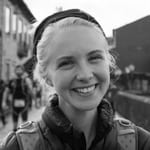[Editor’s Note: In this article, photographer Kirsten Kortebein documents the 2015 Peneda-Gerês Trail Adventure in Portugal directed by renowned ultrarunner Carlos Sá. All photos and words are by Kirsten Kortebein.]
The Peneda-Gerês Trail Adventure–an eight-stage, 280-kilometer mountain race through Portugal’s only national park, organized by Carlos Sá–concluded early this month. Competitors could choose between running the 280-kilometer, eight-stage race, and running an abridged 130-kilometer, four-stage race that took place alongside the longer race.
The four-stage race drew plenty of competition, including Iker Karrera, Danny Kendall, Robbie Britton, Nuno Silva, Christophe Le Saux, and Ester Alves, but the true spirit of the race was most evident during the PGTA’s eight-stage race. There were fewer than 40 competitors who opted to spend 280 kilometers together running through northern Portugal, and in my opinion, they were well-rewarded. The camaraderie and familial spirit that developed was remarkable; since there were so few racers, everyone spent significant time getting to know each other, regardless of racing background or previous experience. Having photographed, observed, and experienced this race as a journalist, I can only do so much to convey the spirit of this race. Therefore, I’ll share thoughts from Brazilian competitor Gustavo Rodrigues, who completed the eight-stage race:
“After having run the Jungle Marathon three times in Brazil, I thought nothing could be more difficult. It took only one stage of PGTA to prove me wrong. The ascents–but mostly the descents–almost broke my legs to pieces. Add to that the most technical course I have ever faced, and you have the result: the most fascinating and, at the same time, exhausting experience of my life. Cold-water river crossings, unending climbs, waterfalls all over the mountains, a mixture of climate conditions, wild horses and wolves along the path, and a unique natural environment make this race an event everyone should attend. It was 280 kilometers of pure adrenaline and amazement in places I could previously have visited only in my imagination… places I never even thought existed. Villagers welcoming you to their houses and showing their lifestyle, trying to figure out what the hell that bunch of funny, colorful creatures were doing running among their homes… they always offered a word or gesture of friendship. The race transforms you and makes you see things from another point of view, making clear the things that really matter in life–something we tend to forget during our busy daily routine.”

Runners gather at the start line of the race’s first stage. The stage’s 43 kilometers was open to entrants as a charity stage, which encouraged around 1,000 local runners to sign up for the race. “For many people, this is their first trail race,” said Rui Ribeiro, who organized the PGTA.

Competitors head off into the mountains during Stage One. The PGTA was organized to accommodate both experienced and less-experienced ultrarunners.

The race’s course throughout the eight-stage race threw competitors a number of landscapes and obstacles to navigate. The river pictured here is tame, but one of the biggest challenges runners faced was the unpredictability of water levels in the rivers. There was heavy rain nearly every day, and this caused dramatic surges in river speed and level. The race course had to be changed a number of times throughout the week in order to re-route around dangerous river conditions.

“After the first stage of the race, we really began to feel the size and the peace of the mountains… because every day, we had a huge playground all to ourselves.” –Pedro Lizardo, Portugal

The owner of a local cafe cleans up after a slew of tired runners came through for pre-race coffees.

The front of the pack sets out through castle ramparts on the morning of Stage Five.

Nuno Silva, who competed in the four-stage race, navigates a field of slippery rocks during his second race day in the national park.

“International friendships really flourish during shared athletic experiences like this,” said German competitor Joe Kelbel (left), pictured here with Brazilian competitor André Ferreira. “These are lifelong connections that will truly last, will be maintained.”

Spending time waist deep in rivers became a normal part of the competitors’ days. “Every day felt like a true adventure,” said Brenda Williams.

Portugese ultrarunner Joaquim Sampaio nears the end of Stage Two of the PGTA. Joaquim is 67 years old, and will compete later this year–for the second time–in Tor des Géants.

A runner jumps into a cave during the race’s long stage.

Christophe Le Saux runs past a hórreo, which is a traditional Portuguese granary, during Stage Four. Christophe took part in the eight-stage race in Portugal before heading to Transvulcania directly afterward. He was also immensely popular with other runners, elite and non-elite, and he clearly enjoyed forging friendships with people from around the world.

One of the special aspects of the PGTA was that its course wove through so many small villages. Without fail–rain or shine–locals would come to cheer on runners as they sped through town.

A competitor spends his third hour in the rain during the race’s long stage. Downpours became routine for those racing the PGTA, which was well-summed up in a statement by Robbie Britton at the conclusion of the final stage: “It was really nice of them to organize all this rain to make us Brits feel at home,” he joked.

Chilean competitor Moisés Jiménez passes through a forest during Stage One of the eight-stage race. “The beauty of the place definitely makes you go further,” said Singaporean competitor Peh San of the course’s landscape. “I was supposed to run 130 kilometers, but ended up doing 222 kilometers… that’s a personal record!”

Runners gather at the starting line of the PGTA’s night stage. The day’s 15 kilometers kicked off at 9:00 p.m., and unsurprisingly, included a lot of rain. For those competing in the four-stage race, this was their first stage. This meant that instead of just 35 competitors (those participating in the eight-stage race) taking part in the night stage, there were over 400 runners. “It almost feels like I just arrived, and started running a totally different race,” said one eight-stage competitor of the change in numbers. “It’s cool.”

Competitors take advantage of an aid station during the night stage. The race’s aid stations were a big hit with the runners; they included lots of energy-giving foods native to Portugal, like local honey, jams, and fruits. “The first aid station on day six was the best,” said one competitor. “It was like a buffet! They were seriously roasting a whole ham.”

A pack of front runners speeds towards the finish one kilometer from the end during the night stage.

American competitor David Loutzenheiser takes advantage of his host home’s garden hose after Stage Four of the eight-day race. “The rain in Spain falls mainly in Portugal,” he said of the weather in the mountains. “It left our feet looking like sponges.”

Spain’s Iván Ramírez Bator takes on one of the race’s many technical downhills during Stage Two. “This was a different sporting experience,” he said. “In addition to the scenery of the national park and the good work of Carlos Sá, the atmosphere we shared with each other as athletes was excellent.”

“We call this area ‘Portugal’s little Tibet,'” said race organizer Rui Riberio of the terraced farms in this stage.

A competitor avoids getting his shoes (even more) wet during Stage Seven, one of the less-rainy days of the PGTA.

“When you look at the first stage, you think it seems huge, looks almost impossible… but the stages are so well-designed that as the days go by, you begin to think ‘Oh, it’s just another day at the office…’ but it’s a huge challenge in the end.” –Pedro Lizardo

“We were invited to participate in a challenge: run 280 kilometers with over 16,000 meters of gain… the climbing alone was the biggest challenge for so many of us who ran. But our greatest achievement at the end of the race was not about these numbers–our greatest achievement is that we became a family. During these eight days, we developed a sense of brotherhood, support, and companionship comparable to that which we feel with our own families… and that feeling, I think, we will remember forever.” –André Ferreira

Carlos Sá dances a traditional Portuguese dance called the “vira” after completion of the Peneda-Gerês Trail Adventure. Carlos, who founded and organized the race, was just as actively involved–if not more so–in the stages than the competitors. His love for Portugal and for the national park was so tangible throughout the duration of the eight-stage race; he was regularly seen sprinting out of the woods with a grin about 15 minutes before the front runners, making sure that the course was still clear and well-marked.
